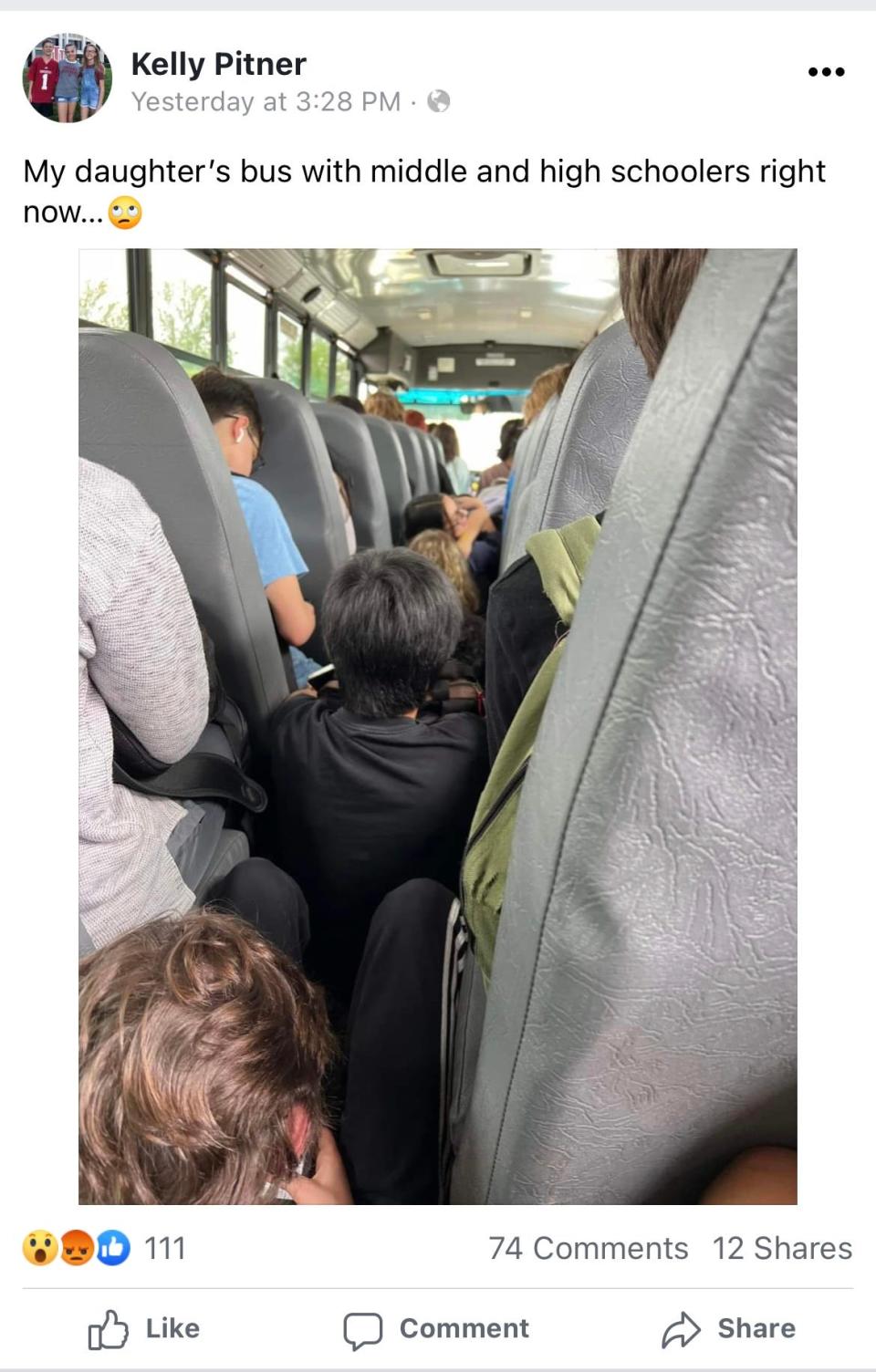Column: MCCSC start time plan leaves struggling families in the lurch. Maybe you can help

My kid's bus driver is a hero.
Somehow, every day, after several routes, he greets me kindly and says goodbye to my daughter with a distracting busload of kids behind him.
She only takes the bus home — our stop is incredibly unsafe during morning rush hour, and it's impossible for the driver to get them to school by the 9 a.m. elementary start time. Monroe County Community School Corp.'s transportation office didn't issue him a Time Turner this year to make that possible.
When I heard Monroe County Community School Corp.'s new schedule would eliminate 38 bus routes, I wanted to be happy. Drivers need this change.
Unfortunately, the adjustment doesn't help answer one of the hardest questions we face today: What do parents of school-aged kids do when they don't have full-time daycare?
Read more: MCCSC changes school start and end times for 2022-23
Typical answer: Before and after school care offered by the district. Which tends to fill up quickly and cost money many families don't have. It's why many people, especially women, quit working when they have a child. (A child they may have had to waitlist for daycare while still in the womb.)
In the post-pandemic-still-kind-of-pandemic world, everything seems more expensive except human labor. That means all families are even less likely to have the extra money for before and after school care. In my family, where two people work full time, we don't often buy new things and I can't even begin to make a student loan payment.
If I have a job, and my husband has a job, and we can't keep up, what are the most vulnerable supposed to do? What about the people who will lose jobs because our community's systems don't seem to care?
Working families in Bloomington and Monroe County
In conversations about the new MCCSC schedule, primarily on social media, community members keep referring to "working families." It's an interesting term, since I've never met a family in which someone has never worked, and I know very few in which only one adult in the family has a job.
Let's take a look at what it means for your child to start school at 9:30 a.m. when you have to work at 9.
Some people have jobs which human resources departments would call "exempt." For those workers, an extra half hour doesn't really matter, and they can take their time getting a child to and from school as long as they get the work done.
For everyone else, our pay is calculated down to 15-minute increments. If workers need 30 minutes off, they need to either use PTO, make up the time or forfeit the pay. And this isn't just people who work in factories or restaurants or retail stores. This is your average, everyday, 9-5 office worker. Many workers who employers nickel and dime are in professional jobs that require a degree and experience.
With the bus schedule being so in flux, my coworkers and supervisors have had to spend this year dealing with the reality that I can't promise a time I'll be back at my desk after a drop off or pickup. I can skip lunch or work a little later to make it up, delaying the one meal we all eat together.
Preschool overload: Many Monroe County preschools have lengthy waitlists. What happens when kids can't get in?
Maybe these employers should be more relaxed about these things for hourly workers, but that's not realistic in the context of capitalism. In an ideal world, bus drivers, teachers and working parents would all be paid what they're worth just to get the job done.
MCCSC's plan to expand before school care and offer it free of charge to those who qualify for free lunch is a good idea. But only if they can fund and staff that care to have space for all of those families, and also have enough space for people like us. Many of us who seem to be in the "middle class" and don't qualify for free meals because of our income also don't have any savings, can't buy homes in this community, and our rent costs an entire paycheck or more.
If there are truly "non-working families" in our community, shouldn't there be enough wealth out there to fund feeding children and giving them a place to be before and after school?
A community in crisis
I remember the worst part of the pandemic, when I had COVID. I remember some of it, anyway. I was asleep for the better part of two weeks with my "mild" symptoms, as well as deeply confused by such concepts as, "Where is my kitchen?"
But I remember a stark difference between people with and without a savings account during that time. When you can't leave your home, everything gets more expensive. We only made it through with help from family and friends.
As for the people who didn't have to worry about money (or simply didn't go on a vacation), I can easily split them into two types. Type one is people who bought up all the toilet paper so those of us who live paycheck to paycheck were confronted with empty shelves. (It's also worth mentioning that those who don't have the bank account balance or space in our homes to buy in bulk pay more for toilet paper.)

Type two is the people who sat around having anxiety because they wanted to help people with less than they had, but didn't know how.
At the peak of my COVID-19 symptoms, I could barely function, my face felt like it was on fire all the time, and I received the medical advice of "take vitamins and don't go to the hospital unless you have trouble breathing."
July 2020 column: I sent my daughter back to preschool — now I have COVID-19
One night, we woke up to a panicking, inconsolable dog reacting to the dreaded high-pitched beeping of the smoke detector. We had no 9-volt batteries, and in my COVID fog, I posted on Facebook asking for help.
Someone brought us the battery, and that person was an acquaintance who I've never actually met.
People like this, whose first instinct in a crisis is to figure out how they can help, are the ones who can make our school community stronger. All aspects of our school system — transportation, staffing, administration, facilities, curriculum — are in crisis. And public education needs to be held up by our community to work for everyone. Even if you don't have kids, the experience these kids have in school will intersect with your life at some point.
Do you have disposable income? Can you skip your overseas vacation this year and fund a few of your children's lower income classmates' before and after school care? Do you own a successful business that has funds to donate to your neighborhood school to pay for before and after school staffing? A restaurant that can provide a snack?
If you're homeschooling, can you invite another child? If you don't have to work in the afternoon, can you watch someone else's child? Can you offer free tutoring to the child of a single mom who works more than one job and doesn't have time to help with homework?
If you saw the start time list and your school didn't change, did you wonder how the other schools' families will make it through, or did you breathe a sigh of relief and go about your day without a second thought?
Next time we're on lockdown, will you make sure your family, and only your family, has enough toilet paper, or would you bring a 9-volt battery to someone you've never met?
Jenny Porter Tilley is a digital producer for the Midwest region of the USA TODAY Network. Reach her at jtilley@gannett.com and follow on Twitter @jennylynne.
This article originally appeared on The Herald-Times: Bloomington community can help fix MCCSC bus, start time crisis

